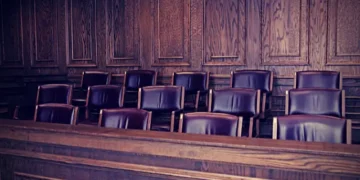Nov 28, 2024 Story by: Editor
Attorneys are calling on the U.S. Supreme Court to abolish Mississippi’s long-standing practice of stripping voting rights from individuals convicted of certain felonies, including nonviolent crimes like forgery and timber theft. Critics argue this policy, originating from the Jim Crow era, disenfranchises thousands for life, with limited pathways to restore ballot access.
“Mississippi’s harsh and unforgiving felony disenfranchisement scheme is a national outlier,” attorneys advocating for affected individuals stated in a Wednesday appeal. They emphasized that other states “have consistently moved away from lifetime felony disenfranchisement over the past few decades.”
This legal challenge is the third since the late 19th century—and the second in recent years—seeking to overturn Mississippi’s disenfranchisement policies. While the Supreme Court rejected a similar case in 2023, this new appeal challenges a ruling by the conservative 5th U.S. Circuit Court of Appeals, which held that legislative changes to the law are the responsibility of Mississippi lawmakers, not the courts.
The Case Against Lifetime Voting Bans
The appeal argues that the practice is unconstitutional, equating it to cruel and unusual punishment. However, the Supreme Court has historically been reluctant to adopt this perspective. In June, justices dismissed similar arguments while upholding bans on public camping for homeless individuals.
Mississippi’s disenfranchisement policy, enshrined in its 1890 constitution, is widely criticized for targeting crimes that its framers believed were more likely to be committed by Black individuals. While a 1974 Supreme Court decision affirmed states’ rights to disenfranchise felons, opponents maintain that these laws were racially motivated.
With Black residents comprising approximately 38% of Mississippi’s population, the law disproportionately affects African Americans. Between 1994 and 2017, nearly 50,000 individuals were disenfranchised under this policy, with over 29,000 having completed their sentences. Of that group, 58% are Black, as revealed by expert analysis for the plaintiffs.
Barriers to Regaining Voting Rights
Mississippi offers limited avenues for restoring voting rights. Individuals must secure a governor’s pardon or receive approval from two-thirds of the state legislature—a process that has resulted in only a handful of restorations in recent years.
A related Supreme Court case argued that Mississippi’s constitutional provisions were designed with racist intent, specifically selecting crimes believed to be more common among Black individuals. Despite this, the court declined to reevaluate a 2022 ruling that claimed Mississippi had remedied the discriminatory intent by revising its list of disenfranchising crimes.
In 1950, burglary was removed from the list, but murder and rape were added in 1968. The list was further expanded in 2009 to include 22 offenses such as carjacking, timber larceny, felony-level shoplifting, and writing bad checks.
Dissent Highlights Discriminatory Roots
Justice Ketanji Brown Jackson voiced her concerns in a 2023 dissent, asserting that Mississippi’s list of disenfranchising crimes was “adopted for an illicit discriminatory purpose.”
This case underscores the ongoing debate over the balance between criminal justice and voting rights, as attorneys and activists strive to dismantle a policy they see as a relic of racial discrimination. Whether the Supreme Court will heed these calls remains to be seen. Source: US News

















